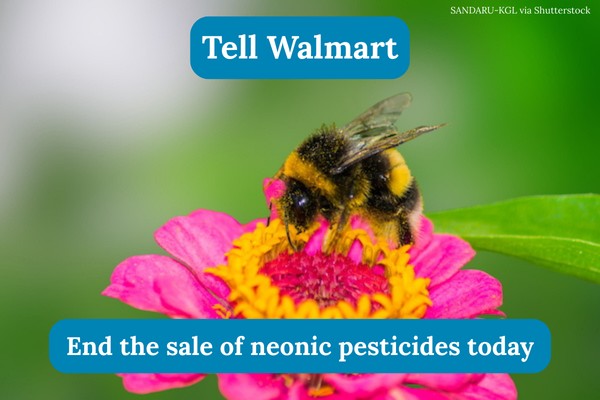
John,
Over the past few years, bees have experienced some of the worst die-offs in recent history.
Around a quarter of America's native bee species are at some risk of extinction, and nearly 70% of commercial honeybee hives are teetering near collapse.1,2
Yet a major cause of these declines -- neonicotinoid pesticides -- are still being sold in stores across the nation, including in major retailers like Walmart.
We're working to protect bees from pollinator-killing pesticides. Add your voice and urge Walmart to stop selling neonics today.
Bees don't just keep wildflower-filled meadows blooming. These busy critters are essential for much of our food system.
From apples and strawberries to cucumbers, almonds, and coffee, more than one-third of the world's crops depend on bees and other pollinators to reproduce.3
Without bees, agriculture would suffer, harvests would shrink and shoppers may start missing some of their favorite foods.
But the neonicotinoids that stores such as Walmart are selling put both our pollinators and our food supply at risk. These chemicals attack bees' tiny nervous systems, leaving them disoriented, unable to forage and often incapable of navigating to their hives.4
And unlike some pesticides, neonics aren't just sprayed. Seeds coated in neonicotinoids account for the majority of corn and soybean planted in the U.S. Just one neonic-coated seed contains enough toxins to kill 80,000 bees.5
When applied to seeds, the chemical can spread throughout the entire plant, even into its pollen and nectar. That means the very foods bees rely on can be laced with traces of these toxic chemicals.6
That's why we need to stop the wide-spread use of this toxic pesticide. Add your name and convince Walmart to take this harmful chemical off their shelves.
Together, PIRG and our national network have campaigned to remove neonics from stores. Already, a dozen states have recognized this danger and, at least partially, restricted the retail sale of neonics.7 In states with those laws, Walmart follows them.
But bees don't stop at state borders, and neither should Walmart's policies. If Walmart can halt the sale of neonics in some states, then they can stop their sale in all of them.
Add your name and urge Walmart to stop the sale of neonic pesticides today.
Thank you for standing with pollinators,
Faye Park
President
1. Leah Sarnoff, "Honey bee colonies could face 70% losses in 2025, impacting agriculture," ABC News, March 26, 2025.
2. Steve Blackledge, "Seven actions that can save bees and other pollinators," Environment America, June 26, 2025.
3. "The Importance of Pollinators," U.S. Department of Agriculture, last accessed August 27, 2025.
4. Steve Blackledge, "Should you be worried about the 'Insect Apocalypse'?," Environment America, June 26, 2025.
5. Steve Blackledge, "How just a single seed can kill 80,000 bees," Environment America, June 30, 2025.
6. Steve Blackledge, "How just a single seed can kill 80,000 bees," Environment America, June 30, 2025.
7. Steve Blackledge, "States that are doing the most to save pollinators," Environment America, June 16, 2025.
Support U.S. PIRG. Contributions by people just like you make our advocacy possible. Your contribution supports a staff of organizers, attorneys, scientists and other professionals who monitor government and corporate decisions and advocate on the public's behalf.
Join us on Facebook | Follow us on Twitter
U.S. PIRG, Main Office: 1543 Wazee St., Suite 460, Denver, CO 80202, (303) 801-0582
Federal Advocacy Office: 600 Pennsylvania Ave. SE, 4th Fl., Washington, DC 20003, (202) 546-9707
Member Questions or Requests: 1-800-838-6554.

If you want us to stop sending you email then follow this link -- unsubscribe.
